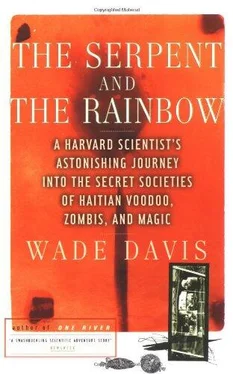Wade Davis - The Serpent and the Rainbow
Здесь есть возможность читать онлайн «Wade Davis - The Serpent and the Rainbow» весь текст электронной книги совершенно бесплатно (целиком полную версию без сокращений). В некоторых случаях можно слушать аудио, скачать через торрент в формате fb2 и присутствует краткое содержание. Год выпуска: 1985, Издательство: Simon & Schuster, Жанр: Старинная литература, на английском языке. Описание произведения, (предисловие) а так же отзывы посетителей доступны на портале библиотеки ЛибКат.
- Название:The Serpent and the Rainbow
- Автор:
- Издательство:Simon & Schuster
- Жанр:
- Год:1985
- ISBN:нет данных
- Рейтинг книги:5 / 5. Голосов: 1
-
Избранное:Добавить в избранное
- Отзывы:
-
Ваша оценка:
- 100
- 1
- 2
- 3
- 4
- 5
The Serpent and the Rainbow: краткое содержание, описание и аннотация
Предлагаем к чтению аннотацию, описание, краткое содержание или предисловие (зависит от того, что написал сам автор книги «The Serpent and the Rainbow»). Если вы не нашли необходимую информацию о книге — напишите в комментариях, мы постараемся отыскать её.
The Serpent and the Rainbow — читать онлайн бесплатно полную книгу (весь текст) целиком
Ниже представлен текст книги, разбитый по страницам. Система сохранения места последней прочитанной страницы, позволяет с удобством читать онлайн бесплатно книгу «The Serpent and the Rainbow», без необходимости каждый раз заново искать на чём Вы остановились. Поставьте закладку, и сможете в любой момент перейти на страницу, на которой закончили чтение.
Интервал:
Закладка:
“What is this stupidity?” Josephine yelled, even as she pulled us closer to her side. “Shanpwel! Open your asses!” The lights went out again, and the cordon around us tightened.
“Watch out!” Isnard screamed at us. “Breathe through your shirt!” For a single terrifying moment we waited, watching the dust suspended in the amber light. This was the time, Isnard believed, that the powder would come. I grabbed Rachel. All I could sense was past and future flowing over us like an uneddying river.
But nothing happened. Amid shrieks of excitement the lights came back on, and as the tension subsided Rachel’s anxiety gave way to indignation.
“Listen,” she said, “if they don’t want us around here we should leave.”
“No, my darling, you are not walking one step!” Josephine was adamant.
“But this is ridiculous!”
“Don’t worry, child, it is past their time.” And she was right. Whatever anger there had been but moments before and given way to laughter and public displays of welcome. The rotund president who had first objected to my presence now took the floor with a gesture of appeasement.
“Brothers and sisters,” he began after the drums had stopped. “I’ll explain something to you.”
“Silence!” someone shouted.
“The question of a man being more a man or less a man, a man being white or a man being black, never changes whether he is right or wrong.” He was interrupted by resounding applause.
“Myself,” he went on, “I know that to want is to be able. I speak publicly now so that my motives will be understood. I took that cassette for a reason. President Jean Baptiste said it was his, and I gave it back to the blanc . But I am no fool. If the blanc comes to my place, he is welcome to record the vodoun part, and he may learn the songs of the Cannibal, but the words must remain ours. The songs are public, but the words are private. That is all. Excuse me, mademoiselle,” he said looking toward Rachel, “I tell you this as a favor.” Rachel thanked him and promised to take him up on his invitation to attend his ceremony, but her words were faint and lost in the growing pressure of impatient drummers and people anxious to dance.
All reflections and recriminations were dashed by the sudden intensity of motion that turned the peristyle into a great circle of spinning light. In a place that minutes before had been packed shoulder to shoulder there was now room for everyone to move. A dance of dervishes, of arms flailing the air, gave way to one of convulsive movements, of feet pounding the ground and raising small clouds of dust that lingered at knee level across the entire floor. Rachel is as good a dancer as I am clumsy, but in the space of moments even I felt pulled by the rhythm. To the delight of all, we leapt into line, moving as one with the Shanpwel as they lunged across the ground. The staccato beat of the drums flung us into the air, or beat us back into line. You could actually feel its vibration striking at the base of your spine and rising like electricity to your skull. For hours it seemed the drums held us like that, sweat pouring from our skin, the smell of incense and dust, of cheap perfume and rum fusing with a mocking sensuality that brought our bodies so close before flinging them apart. My mind wove its way through the night, becoming lost in some vast region of the past, responding only to the steady rhythm, moving like a great strand of kelp floating in a wild current yet all the time anchored firmly to the earth.
I don’t know when it ended. I only remember waking to the cool wind outside the temple, and the dawn breaking through a pearl gray sky. I remember the stillness of the palm trees, and on the road back a few market women on their mules clip-clopping into town, and the lights of Marcel Pierre’s brothel, his clients leaning on the porch enjoying the aftertaste of a night in the darkness with those soft, pliant women I had almost forgotten.
It wasn’t until late the next afternoon that we were able to appreciate the full significance of the recording we had come so close to losing. Amid the flurry of song and dance ritual, two vital pieces of information stood out. First there was the speech. It was a clear public statement that in explicit terms traced the origins of the Bizango directly to the Haitian revolution and the prerevolutionary leaders of the Maroon bands, precisely in the way that the anthropologist Michel Laguerre had proposed. Secondly, and perhaps more immediately important, the tape provided the names of more than a half-dozen prominent leaders in the Saint Marc region alone. With the generous assistance of Rachel’s uncle Robert Erié, we were able in one day to establish contact with five Bizango founding presidents, or emperors. One of the most informative was also the most impressive, a crafty and powerful figure named Jean-Jacques Leophin.
Our first call on Leophin was purely social, and he received us formally. He was an old man, thin, slightly stooped, with a penchant for gold, which he displayed in wide bands on each finger and great loops of chains around his neck. A snap of his fingers brought forth a table and chairs, a tray of ice and whiskey. We drank in the middle of a blue-walled peristyle, surrounded by leaping images of the djab and the penetrating vision of the Black Virgin. In the yard outside, propped up on blocks like an icon, sat a broken-down Mercedes-Benz.
Beneath these and other frills—a black fedora and the habitual use of a cigarette holder—lay the soul, I would soon learn, of a man fully wed to the mystical. When he spoke his eyes sank deep into every listener, and from within his layered phrases came a resonance that lent his words great density. As we got to know him better he struck me as one of those rare people who have managed to forge a unique personal philosophy from a thousand disparate elements of the universe, and who then dedicate their lives to living up to the tenets of their belief. He spoke in parables, reciting myths and legends from Africa, mixing them liberally with citations from Le Petit Albert , a medieval text of sorcery once banned in Haiti, yet still the bible of choice of every conjurer and magician.
“Bizango is a word that comes from the Cannibal,” he explained. “You find this word in the Red Dragon or the books of the Wizard Emmanuel. Bizango is to prove that change is possible. That’s why we say ‘learn to change.’ We are in the world, and we can change in the world. Everyone says that the Shanpwel change people into pigs, but we say this only because it teaches that everything is relative. You may think that you and I are equals, are humans with the same skin, the same form, but another being looking at us from behind might say that we’re two ‘pigs,’ or ‘donkeys,’ or even ‘invisible.’ This is what is called the Bizango changing. That is what it means.
“Long ago the Shanpwel did not exist. The four great Makala nations, that of the north, south, east, and west, formed the Bizango to create order and respect among their people.”
“In the time before the blanc?”
“Yes, before and after. There was a girl from the south who kept taking the words of one leader and passing them around. She was the mouthpiece stirring up trouble. Finally, the four leaders came together, and once they realized what was going on they had to have her executed. A great public feast followed, and it was announced to the people that what happens within the four nations must stay there, and what happens outside stays outside. That’s when they formed the Bizango to protect against the dangers of the mouth. That’s why even today if someone speaks against the society he must be made to respect his mouth. So we all come together.”
“To form a judgment?”
Читать дальшеИнтервал:
Закладка:
Похожие книги на «The Serpent and the Rainbow»
Представляем Вашему вниманию похожие книги на «The Serpent and the Rainbow» списком для выбора. Мы отобрали схожую по названию и смыслу литературу в надежде предоставить читателям больше вариантов отыскать новые, интересные, ещё непрочитанные произведения.
Обсуждение, отзывы о книге «The Serpent and the Rainbow» и просто собственные мнения читателей. Оставьте ваши комментарии, напишите, что Вы думаете о произведении, его смысле или главных героях. Укажите что конкретно понравилось, а что нет, и почему Вы так считаете.












